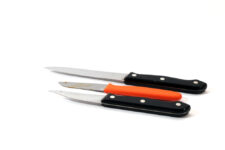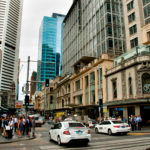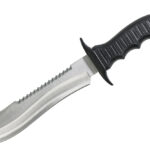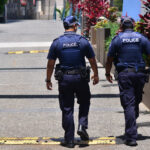The NSW Offence of Carrying a Knife or Blade in a Public Place or School

Police have reported having arrested 140 people on Thursday 18 and Friday 19 December 2020 and charged them with various criminal offences, as part of a police blitz on Sydney streets labelled ‘Operation Saber IV’.
It’s the fourth time a ‘Saber’ operation has been conducted in Sydney this year.
The operation involved officers from the South West, North West and Central Metropolitan regions, including Police Transport and Safety Command and the Traffic and Highway Patrol Command, with assistance from specialist police from the Dog Unit and Operation Support Groups (OSG).
Arrests, seizures and infringement notices
Police says that over the two day period, they seized 41 knives and other bladed objects, made 78 drug detections, issued 254 Traffic Infringement Notices and 384 Transport Infringement Notices, and charged 143 people with criminal offences ranging from possessing a knife in a public place and drug possession, to domestic-violence related offences. Police report also having conducted 44 bail compliance checks.
Saber operations
This year, Saber operations have seen police confiscate 97 knives, make 218 drug seizure, undertake 168 bail compliance checks and put 330 people before the courts for a range of alleged criminal offences.
The initiative is said to be targeted at anti-social conduct.
The first Saber operation occurred in February 2020, ostensibly as a response to what police claim is an increase in crime and anti-social conduct.
Those claims are contrary to reported statistics on crime.
Is it illegal to carry a knife or blade in NSW?
Under section 93IB of the Crimes Act 1900 it is an offence to be in custody of a knife in a public place or a school. This offence carries a maximum penalty of a fine of $4,400, imprisonment for 4 years, or both.
A further offence is outlined under section 93IC of the Act which applies if a person uses or carries a knife that is visible, if the use or carrying occurs:
- In the presence of a person; and
- In a public place or a school; and
-
In a way that is likely to cause a reasonable person to reasonably fear for the person’s safety.
This offence carries a maximum penalty up to $11,000, imprisonment for 4 years, or both.
A ‘knife’ is includes a knife blade and a razor blade.
A ‘public place’ includes any place or part of premises that is open to the public, or is used by the public whether or not on payment of money or other consideration, whether or not the place or part is ordinarily so open or used and whether or not the public to whom it is open consists only of a limited class of persons.
A statutory defence (which is an offence relating specifically to the offence) exists for both offences if the accused person establishes ‘on the balance of probabilities’ (in other words, more likely than not) that he or she had a reasonable excuse for carrying the knife.
Under the Act, a reasonable excuse is where it was necessary to carry or use the knife for:
- The lawful pursuit of the person’s occupation, education or training, or
- The preparation or consumption of food or drink, or
- Participation in a lawful entertainment, recreation or sport, or
- The exhibition of knives for retail or other trade purposes, or
- An organised exhibition by knife collectors, or
- The wearing of an official uniform, or
- Genuine religious purposes, or
- During travel to or from or incidental to any of these activities.
Carrying a knife for the purposes of self-defence or defence of another is not a reasonable excuse.
Police stop and search powers in NSW
Police powers to stop and search a person or vehicle are primarily contained in the Law Enforcement (Powers and Responsibility) Act (LEPRA) 2002.
The bill was introduced into NSW state parliament in 2001 with a view to consolidating the main powers of police into one piece of legislation.
The term ‘suspects on reasonable grounds’ is used throughout the LEPRA, and it means officers cannot conduct arbitrary or random searches of you or your vehicle – they must have some factual basis upon which to base their suspicion that you have done something wrong; such as committed an offence or have something illegal or dangerous on you or in your vehicle.
Searches without a warrant
Part 4 of the LEPRA details when police have the power to stop, search and detain an individual without a warrant.
Officers can do so when they reasonably suspect that a person possesses stolen property, has anything used or intended to be used to commit an offence, is carrying a dangerous item or weapon, or is in possession of an illegal substance.
Police may seize and detain any of such items.
Police also have ancillary powers to order a person to open their mouth for the purpose of a search, and to shake their hair if they suspect something is being concealed within it. Failure to comply with this request can result in a maximum penalty of a $550 fine.
A person can also be searched in a public place or a school if officers have a reasonable suspicion that they’re carrying a knife or a laser pointer. An officer can confiscate such items, and failure to comply with the search can result in a fine of up to $5,500.
Searching a vehicle without a warrant
Police can stop, search and detain a vehicle without a warrant if they have a reasonable suspicion that it contains stolen items, has been used in an offence, is carrying anything used, or to be used, in an offence, or is carrying any illegal substances.
If a vehicle is in a public place or in the vicinity of a school, police can search it if they reasonably suspect it contains a dangerous item, or is putting the public at risk.
Officers can seize and detain any such items.
A vehicle can also be stopped by police if they have a reasonable suspicion it is carrying a person they have grounds to arrest and detain.
Failure to comply with such directions under these circumstances can result in a fine of up $5,500 and/or 12 months imprisonment.
Strip searches
Under section 31 of the LEPRA, police have the power to carry out strip searches if they deem it necessary for the purposes of a search. This can be done at a police station or in any other place if considered it must be done urgently.
A strip search must be conducted in a private area by a member of the same sex. At no time should a person’s body cavities be searched, nor should a person be touched in any way.
No person should be present who is not needed for the purposes of the search, nor should any item of clothing be removed unnecessarily.
Strip searches must not be carried out on children under the age of 10.
Going to court for possessing a knife?
If you have been charged with possessing a knife, call Sydney Criminal Lawyers anytime on (02) 9261 8881 to arrange a free first conference with an experienced criminal defence lawyer who will advise you of your options and the best way forward.








